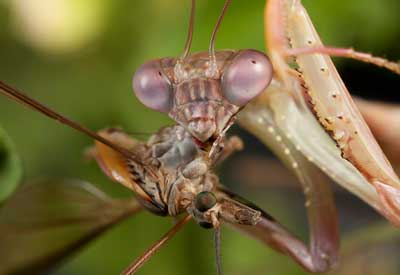Take the Planet Natural true or false test and find out how much you know about beneficial garden insects. It’s also a fun way to learn more about how “good bugs” can help you grow a better garden.
1. Beneficial insects only dine on other insects. True or False
False. Insects. It’s not just what’s for dinner for beneficial insects. Depending on their life cycle, beneficial insects spend time where they exclusively eat nectar and pollen. This is important to know if you want to keep beneficials healthy. You need to ensure an adequate supply of all food types for beneficial insects to keep them strong. Treat them well by growing what’s known as “insectary plants.” Hedgerows work, but if you don’t have the space, consider planting a border of dwarf fruit and flowering trees mixed with flowering shrubs and perennials. Other insectary plants include fennel, angelica, coriander, dill and wild carrot. Various clovers, yarrow and rue also are good choices. Ground beetles favor thyme, rosemary or mint. Composite flowers (daisy and chamomile) and mints will attract predatory wasps, hover flies and robber flies.
2. Selective weeding helps beneficial insects. True or False
True. Leaving certain plants for beneficial insects instead of weeding them can be a great idea. The key is to pick (or actually not to pick) the right kind of plant. Large, nectar-filled blooms can actually drown tiny parasitoid wasps. Look for tiny flowers that bloom in quantity. They are much more useful to beneficial insects.
3. Beneficial insects can be split into two categories: insect predators or parasites. True or False
True. Adult or adolescent insects act as predators. They eat other insects. Predators include ladybugs, lacewing and spiders. Insect parasites develop in or on a host from eggs or larvae deposited by the adult parasite. Common insect parasites are tachinid flies and braconid and trichogramma wasps.
4. Ground beetles are selective in what they will prey on. True or False
False. Ground beetles are general feeders. Any garden pest that spends part or all of its life on the ground is open game for a ground beetle.
5. Bugs are the “vampires” of the insect world. True or False
True. Bugs prey on insects and mites. They feed by piercing their prey with their mouthparts and sucking out the bodily fluids of their victims. It’s true they are not blood suckers, but they are the closest you’ll come to Count Dracula in the insect world.
6. Spiders always use webs to trap prey. True or False
False. While some spiders do use webs – think of Charlotte’s Web – there are many other kinds of spiders, including wolf spiders, crab spiders, jumping spiders – that don’t use webs. Instead they prowl around and hunt their prey on soil or on plants.
7. There’s no need to research what naturally occurring insect predators may live on your grounds or garden. It’s always good to stock up on more. True or False
False. It’s important to find out what insects and parasites are already working on your behalf rather than unintentionally undermining their efforts by adding new populations of beneficial insects.
8. If beneficial insects aren’t doing the job, it’s better to go for a broad spectrum insecticide. True or False
False. It’s always best to use more selective insecticides. That will be less harmful to your garden, you and what beneficial insects are present.
Scoring. Award five points for each correct answer and subtract five for each incorrect reply.
0-10 – You need to bone up more on bugs, but don’t fret. We’ve got enough gardening advice here to help you become an expert.
15-25 – You’re getting there, but still can learn. This is a good place to be – room for improvement but a nice start.
30-40 – You’re getting a little buggy, huh? Good job on the true and false.
Beneficial Insect T.L.C.Don’t use chemicals and if you find you must use them, opt for the less toxic ones: neem, horticultural oils and insecticidal soap. Do provide beneficial insects with water. Filling a pie dish or pan with water is a nice way to reward the insects that are helping you fight the war against pests. Don’t forget that birds can help, too. Birds are great at controlling pests. Plant trees and shrubs with berries to attract them. Birdhouses and bird dishes for water are also good ideas. Do give insects shelter. Leave some leaf litter or garden debris under shrubs and plants to give beneficial insects a place to seek shelter during the hot part of the day. Don’t use zapper lights to electrocute insects. These can do more harm to beneficial insects than they will to help curb your pest population. |











